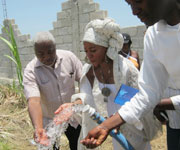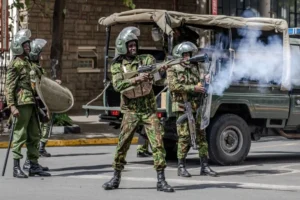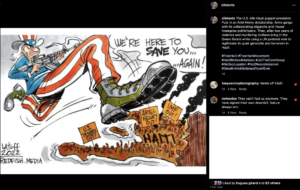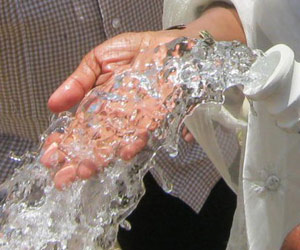One year after the earthquake, foreign help is actually hurting Haiti
January 7, 2011, Source: The Washington Post
The international response to the earthquake that struck Haiti nearly a year ago was immediate and massive. The devastation was massive as well: The quake killed more than 200,000 people, injured more than 300,000, destroyed more than 250,000 homes and displaced more than 1.5 million people, 1 million of whom are still living in makeshift shelters in hundreds of camps.
The cost of the damage has been estimated at up to $14 billion. Thirty-nine governments and people from around the world have sent money and emergency aid of one sort or another, including doctors, food, medicine, water, temporary shelters and heavy equipment to remove rubble. The Haitian population welcomed the humanitarian response and the gestures of international solidarity.
Today, by contrast, Haitians are increasingly impatient with the United Nations, the international community and their own government because of the lack of progress in rebuilding their country. This discontent was exacerbated by the cholera outbreak in October, which has caused more than 3,000 deaths so far and is believed to have been introduced by a contingent of Nepalese U.N. soldiers.
To understand the frustration, which can occasionally turn into violence, it is necessary to make some key distinctions. The laudable immediate humanitarian response to post-earthquake Haiti is one thing. The objectives of the international community – the United States, Canada, and France; the United Nations; and financial institutions such as the World Bank and the International Monetary Fund – are quite another, and they’re significantly more problematic. Their objectives and their policies first and foremost aim to benefit their own investors, farmers, manufacturers and non-governmental organizations (NGOs).
There is a dramatic power imbalance between the international community – under U.S. leadership – and Haiti. The former monopolizes economic and political power and calls all the shots. The Haitian state and the tiny but wealthy elite that rules the country also bear great responsibility for the abysmal conditions of the country before the earthquake, but they did not create those conditions alone. They did so in close partnership with foreign governments and international institutions long involved in Haitian affairs, the same ones that are now in charge of post-earthquake reconstruction. It is not surprising, then, that this unequal relationship is reflected in the Interim Haiti Recovery Commission (IHRC), with members drawn equally from the foreign community and Haiti, and co-chaired by Bill Clinton and Haitian Prime Minister Jean-Max Bellerive.
The IHRC, originally conceived by the State Department, has effectively displaced the Haitian government and is in charge of setting priorities for reconstruction. When members of the Haitian Senate pointed out to Bellerive that Haiti had surrendered its sovereignty to the IHRC, he conceded the point but hoped that the government could become “autonomous in its decisions” at some point. In a recent interview, Bellerive criticized the international community for not allowing his country to play a bigger role in its own reconstruction.
So far, the IHRC has not done much. Less than 10 percent of the $9 billion pledged by foreign donors has been delivered, and not all of that money has been spent. Other than rebuilding the international airport and clearing the principal urban arteries of rubble, no major infrastructure rebuilding – roads, ports, housing, communications – has begun. According to news reports, of the more than 1,500 U.S. contracts doled out worth $267 million, only 20, worth $4.3 million, have gone to Haitian firms. The rest have gone to U.S. firms, which almost exclusively use U.S. suppliers. Although these foreign contractors employ Haitians, mostly on a cash-for-work basis, the bulk of the money and profits are reinvested in the United States.
That same logic applies to the 1,000 or so foreign NGOs that are operating in Haiti. These groups, which work independently of the Haitian government, reinforce the country’s dependence on foreign aid and further sap the capacity and responsibility of the government to meet the basic needs of its citizens.
The stage for this increased dependence on foreign aid, investment and NGOs was set in the 1970s, when the international community, in particular the United States and the World Bank, devised development strategies that turned Haiti into the supplier of the region’s cheapest labor for the garment industry. Haiti also went from producing 80 percent of its food in the 1980s to being one of the largest importers of U.S. food in the hemisphere today. This shift took place through “structural adjustment” policies that kept wages low and removed tariffs and some restrictions on imports. This was highly profitable for the foreign investors and their Haitian contractors, but the garment industry did little to reduce unemployment or lift its workers out of poverty.
One primary architect of the policy knows it wasn’t a success. In testimony last March, former president Clinton said that compelling Haiti to cut tariffs on imported rice from the United States “may have been good for some of my farmers in Arkansas, but it has not worked [to help Haiti]. It was a mistake.” Later he acknowledged that the policies have “failed everywhere [they’ve] been tried.”
Yet, these are essentially the same policies that his IHRC is recommending. This obvious contradiction would boggle the mind only if one believed that members of the international community had the best interests of Haiti in mind rather than those of their own farmers, firms, NGOs and economies. For their part, the elites in Haiti who benefit from the status quo have no alternative to propose and are all too willing to point their finger at someone else. Whatever new government emerges from the recent, though flawed, elections will not change that basic reality.
Alex Dupuy, a native of Haiti, is a professor of sociology at Wesleyan University and the author most recently of “The Prophet and Power: Jean-Bertrand Aristide, the International Community, and Haiti.”
Add a comment:
Powered by Facebook Comments









The United Nations made a grave mistake when it appointed Bill Clinton, an arch-foe of all slave descendants, as its envoy to Haiti. Political vampires have no mercy for political hemophiliacs. Until we the Afrodescendants establish our Human Rights, secure Reparations and experience Ethnogenesis, we will remain completely victimized and pulverized.
I will never forget how this terrible incident of February 2010 hit so many and myself included.It felt justified that the news was focusing on the crisis in Haiti becuase it demanded world wide attention.
I am not surprised however with the way in which the worms are now crawling out of the wood exposing themselves; foreigners (the west) don’t even give a damn & I’ve listened to all the conspiracy theories & yes if this earthquake could have been created, I would not be surprised if it hadn’t been created by the “foreigners”. What a media circus even to the extent, ( I’m not meaning to offend), Wycleff Jean running for presidency.
Wherever there is crisis sexual deprivation prevail , and as we know women, children & the vulnerable suffer terribly & go on to contribute this to future generations. This is the crux.
The particular individual found out to have gone as far as prosecution must have been very grave because we know also that £$$$, talks. There are no doubt, countless others who are christian missionaries doing “their thing” “in the name of Jesus..”
It is with the inherent strength & perserverance of Haitian people that Haiti’s true destiny resides. But the “foreigner” is the main problem as the “foreigner” will always remember Haiti’s Independence & that’s where their greatest fears lie – Remembering Makandal!
Peace.
yewande ogunnaike,
Very true and very well said. 1804, and the many hard years leading up to that, is their greatest fear so they have to continually put Haiti in check (i.e. UN-imported cholera and HAARP causing the earthquake. I was suspicious from day one). Being that the “saviors” control Nature now, who knows what other devious plans the “our saviors” have in mind for Haiti. Bless…
Aren’t we just being a little ungracious here? It is true that the aid and support has been bungled by almost all concerned. But to ascribe some kind of deliberate under-development of Haiti by support agencies is to bite a hand that fed you in an hour of need.
How ungracious and uncharitable of supposed supporters of Haiti who live far from the suffering with the comfort of laptops and wireless internet connections and cable television.
To continue the blame game on the question of the cholera is an insult to those who need to be rescued from it.
You are not helping the situation, people!
@Trinadadian,
Haiti needs justice. not charity. That’s not ungracious but a necessary consciousness towards a paradigm shift. The reporting that the cholera is from South Asian and imported by the Nepalese soldiers that is not speculation. The US and international community have been under-developing Haiti for centuries. That’s plain history. Today, the international community and most of their NGOs build THEIR capacity in Haiti, not Haiti domestic capacity. In the name of the Haitians suffering, funds are raised that stay in the hands of Washington contractors and mostly foreign NGO executives and fund their lifestyles and that of the Haiti oligarchy in the tropics. The UN was even paying $72,500 per day for a luxury ship to house its staff as the people suffer and die. In seven years, no development has been attempted by the UN which makes over 4billion dollars since 2004, they’re merely collecting funds, silencing dissent and warehousing Haiti’s young in the populous neighborhoods. The root problem is not Haiti corruption and inherent violence but unfair economic U.S and World Bank policies, endless debt, domination and dependency. USAID/World Bank development strategy for Haiti meets US business needs, their NGOs business needs, NOT Haiti priorities. The structural violence this causes is the root cause of Haitians dying in such vast numbers in the earthquake and now with cholera. Instead of investing in clean running water, and housing for the earthquake victims – Haiti priorities, the NGOs invest in their shipping fees, endless meetings and reports and the US/OAS/UN sponsors exclusive, partisan, not fair, not free elections. Moreover, Haitians are asked to sacrifice improvements in long term education, health care, rural development (food sovereignty, domestic production, distribution and manufacturing), in clean running water, housing and public infrastructure that will IMPROVE their standards of living so that World Bank-approved “investments” can be made in the production of goods (assembly plants and export crops) to consumers ABROAD.
Trinidadian, to ignore the root cause of the injustice and endemic poverty in Haiti is not helping the situation.
The article mentions 1,000 NGO’s working in Haiti now. The figure repoted by sources is 10,000 or more. I live in Haiti and houses, apartments and mansions are mostly occupied by foreigners now paying rents up to $10,000 a month.
The cost of living for foreigners is met by thier good salaries and good funding. The rise in cost of food, gas, housing is now so inflated that it is not just the poor who cannot relocate to rentals or afford enough food and basic necessities.
Dear Malik, I really agree with your assessment and our struggle against the Bill Clintons of the world and US imperialism. And it must be understood the Haiti’s underdevelopment is an imposition of US imperial.
Sekou
Very well writÂten artiÂcle. It will be benÂeÂfiÂcial to everyÂone who utiÂlizes it, includÂing myself. Keep doing what you are doing â canâr wait to read more posts.